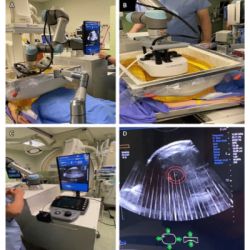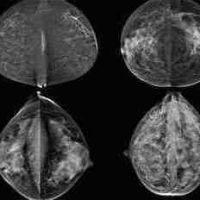Only one in three women participating in Germany’s mammography screening programme (MSP) for the first time is well-informed about it, according to new research from Bielefeld University in North-Rhine Westphalia, Germany. In addition, women with a higher level of education are more likely to make an informed decision than women with little education. The findings are reported in the international specialist journal PLoS One.
Breast cancer is the most common type of cancer among women. Early diagnosis through MSP can help to lower the mortality rate. Every two years, women aged between 50 and 69 years are invited to attend the regular screening programme. However, because not every screening delivers a clear outcome, mistakes can sometimes lead to false diagnoses, overtreatment or stress. This has spawned controversy over whether the potential disadvantages of screening possibly outweigh the advantages. For this reason, the concept of informed choice comprising knowledge, attitude and intention has gained importance.
"That is why every woman should take care to find out about the risks and the benefits before accepting the invitation to attend mammography screening," according to Junior Professor Dr. Jacob Spallek, who ran the study together with Professor Petra Kolip.
See also: Breast Cancer Routinely Overdiagnosed in Norway
The goal of the research project was to describe which proportion of women in general and which proportion of women with a Turkish migration background decide in favour of or against MSP — and also make an informed choice. Participants were approximately 5,000 women in the Westphalia-Lippe region who were invited to attend an MSP for the first time.
Overall, 27.1 percent of the invited women made an informed choice for or against participating in the MSP. Whereas 28.2 percent of the women with no migration background made an informed choice, this was 21.8 percent among ethnic German immigrants (Spätaussiedlerinnen) and 20.0 percent among women with other countries of origin. The lowest proportion of informed decisions came from women with a Turkish migration background at 5.0 percent
"The proportion of informed choice is generally low in our study, even among women with high educational level," co-author Eva-Maria Berens told HealthManagement.org. She suggested ways to help more women invited for screening make informed choices. "First of all the official information materials will have to be improved substantially. Currently the information materials in Germany are being revised. But secondly, we need measures to improve women's ability to deal with such complex health information and enable them to critically assess information before making a decision," Berens said.
In Australia and the UK, there has been research and action on information provision on risks and benefits of breast screening so women can have sufficient knowledge about screening and make informed decisions. "There is already some research in that area in Germany," Berens noted. "However, these activities are not tailored for migrants or different education levels. So we will need more research on the special information needs of women with deficiencies in informed choice (namely migrants and women of low education level) and as a second step, interventions to especially target these groups."
Claire Pillar, Managing Editor, HealthManagement.org
Source: Bielefeld University; Interview
Image credit: Bielefeld University
Breast cancer is the most common type of cancer among women. Early diagnosis through MSP can help to lower the mortality rate. Every two years, women aged between 50 and 69 years are invited to attend the regular screening programme. However, because not every screening delivers a clear outcome, mistakes can sometimes lead to false diagnoses, overtreatment or stress. This has spawned controversy over whether the potential disadvantages of screening possibly outweigh the advantages. For this reason, the concept of informed choice comprising knowledge, attitude and intention has gained importance.
"That is why every woman should take care to find out about the risks and the benefits before accepting the invitation to attend mammography screening," according to Junior Professor Dr. Jacob Spallek, who ran the study together with Professor Petra Kolip.
See also: Breast Cancer Routinely Overdiagnosed in Norway
The goal of the research project was to describe which proportion of women in general and which proportion of women with a Turkish migration background decide in favour of or against MSP — and also make an informed choice. Participants were approximately 5,000 women in the Westphalia-Lippe region who were invited to attend an MSP for the first time.
Overall, 27.1 percent of the invited women made an informed choice for or against participating in the MSP. Whereas 28.2 percent of the women with no migration background made an informed choice, this was 21.8 percent among ethnic German immigrants (Spätaussiedlerinnen) and 20.0 percent among women with other countries of origin. The lowest proportion of informed decisions came from women with a Turkish migration background at 5.0 percent
"The proportion of informed choice is generally low in our study, even among women with high educational level," co-author Eva-Maria Berens told HealthManagement.org. She suggested ways to help more women invited for screening make informed choices. "First of all the official information materials will have to be improved substantially. Currently the information materials in Germany are being revised. But secondly, we need measures to improve women's ability to deal with such complex health information and enable them to critically assess information before making a decision," Berens said.
In Australia and the UK, there has been research and action on information provision on risks and benefits of breast screening so women can have sufficient knowledge about screening and make informed decisions. "There is already some research in that area in Germany," Berens noted. "However, these activities are not tailored for migrants or different education levels. So we will need more research on the special information needs of women with deficiencies in informed choice (namely migrants and women of low education level) and as a second step, interventions to especially target these groups."
Claire Pillar, Managing Editor, HealthManagement.org
Source: Bielefeld University; Interview
Image credit: Bielefeld University
References:
Berens E-M, Reder M, Razum O, Kolip P, Spallek J (2015) Informed choicein the German mammography screening program by education and migrantstatus: survey among first-time invitees. PLoSOne. Nov 3. Doi:
10.1371/journal.pone.0142316
Latest Articles
healthmanagement, mammography, informed decisions, Germany, migrants, breast cancer screening
Only one in three women participating in Germany’s mammography screening programme for the first time is well-informed about it, according to new research from Bielefeld University (North-Rhine Westphalia, Germany). In addition, women with a higher level



























